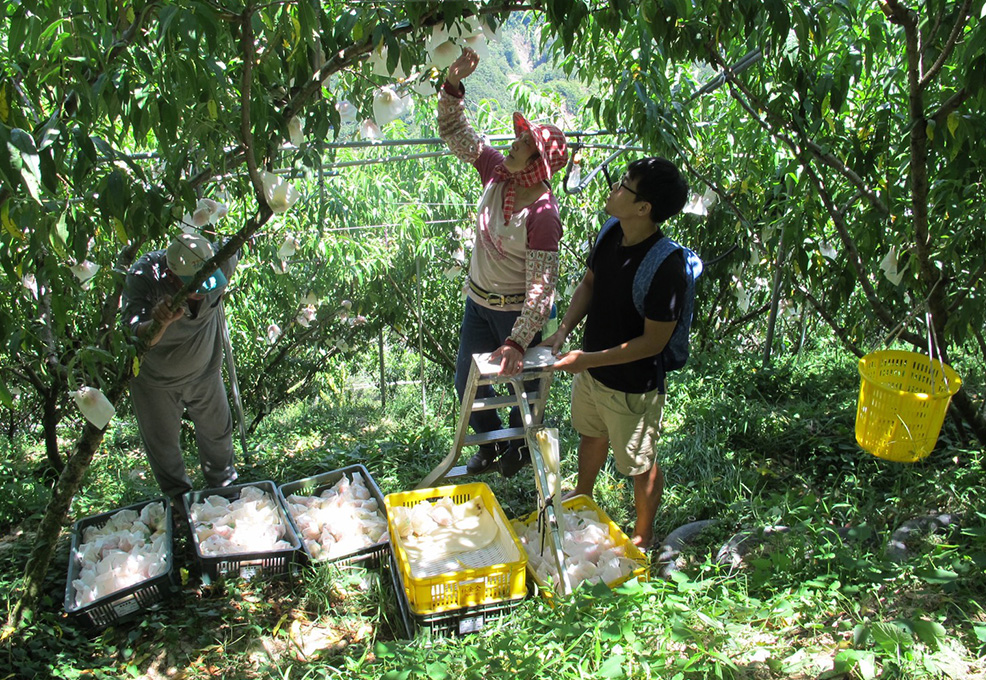Austronesian Connection Between Taiwan and Indonesia

Author(s)
Yu-Kai ChangBiography
Yu-Kai Chang, Ph.D., Research Chair Professor in the Department of Physical Education, National Taiwan Normal University and the Director of the Physical Activity and Cognitive Neuroscience Laboratory. Dr. Chang is currently managing council member of both the International Society of Sports Psychology (ISSP) and the Asian-South Pacific Association of Sport Psychology, and the mental consultant for the Chinese Professional Baseball League. Dr. Chang was awarded the Ta-You Wu Memorial Award of the National Science Council and the Outstanding Research Award of the Taiwan Ministry of Science and Technology in 2012 and 2018, respectively. He also won the Young Scholar Award of the ISSP in 2013, the Young Scholars Award of the North American Society of Physical Activity and Sport Psychology in 2014, the Chinese Young Scholar Award of ISSP Chinese Section in 2012, the Youth Prize: Scholar Category of the China Youth Corps in 2011, and Outstanding Doctoral Dissertation Award of UNCG in 2009. Dr. Chang’s research focuses on Sports and Exercise Psychology, especially concerning issues of Exercise and Mental Health, Sports/Performance Psychology, and Mindfulness, undertaken from a cognitive neuroscience perspective. Currently, Dr. Chang is the editor-in-chief of Sports Journal (TSSCI) and is on the editorial committees of four international SSCI/SCI journals. Dr. Chang also specializes in Chinese martial arts (Bagua, Xingyi, Taiji, Shaolin).
Academy/University/Organization
National Taiwan Normal UniversitySource
Brand, R., Timme, S., & Nosrat, S. (2020). When pandemic hits: Exercise frequency and subjective well-being during COVID-19 pandemic. Frontiers in Psychology, 11(2391).
Chang, Y. K., Hung, C. L., Timme, S., Nosrat, S., & Chu, C. H. (2020). Exercise behavior and mood during the COVID-19 pandemic in Taiwan: Lessons for the future. International Journal of Environment Research and Public Health, 17(19), 7092.
Papaioannou, A. G., Schinke, R. J., Chang, Y. K., Kim, Y. H., & Duda, J. L. (2020). Physical activity, health and well-being in an imposed social distanced world. International Journal of Sport and Exercise Psychology, 18(4), 414-419.-
TAGS
-
Share this article
You are free to share this article under the Attribution 4.0 International license
- HUMANITIES & SOCIAL SCIENCES
- Text & Image
- January 16,2021
The rapid spread of COVID-19 has plunged the world into fear and chaos. In order to stop the spread of the virus, many countries have adopted epidemic prevention measures such as lockdowns, quarantines, and social distancing. These measures have in turn presented new challenges for the lives, behavioral models and physiological state of human beings. In 2020, National Taiwan Normal University Research Chair Prof. Yu-Kai Chang and his research team began to engage in international collaboration with the objective of providing adaptive measures for epidemic prevention, exercise, and psychological health for Taiwan and the world in light of the ongoing and future pandemics. This article focuses on the three major findings of a novel study on the links between Taiwan’s epidemic and the exercise behaviors and psychological health of its people conducted by Prof. Chang and his team. The three findings are as follows: Taiwanese are still able to maintain their exercise behaviors during the lockdown; future pandemics will affect the health behaviors of Taiwanese; and their exercise behaviors determine their mood. Generally speaking, Taiwan’s success in preventing the spread of the virus within the country has enabled its citizens to maintain their exercise habits in the midst of a global pandemic, with some responding that they might even increase exercising in upcoming pandemics. Taiwan’s handling of the pandemic, along with the existence of the virus, could provide an opportunity to transform or upgrade Taiwan’s sports and exercise industry.
COVID-19 - The greatest challenge in epidemic prevention in 2020
Since the first case was detected in Wuhan, China in January, 2020, COVID-19 spread across the globe within a few months. As of October, 2020, 188 countries had been inflicted by the virus; more than 43 million people had tested positive, compared to 80,000 at the end of February; more than 1.1 million had died from it; and fear and paranoia are felt all around the world.
The behavioral and psychological impacts of COVID-19
In order to curb the spread of the virus, many countries have taken epidemic prevention measures with varying degrees such as locking down cities and even the whole country, imposing quarantines, and enforcing social distancing. These measures have in turn presented new challenges for the lives, behavioral models and physiological state of human beings. Given that exercise is an effective approach to enhancing our physical and mental health, National Taiwan Normal University, Research Chair Professor Yu-Kai Chang, also the Managing Council (MC) member of the International Society of Sport Psychology (ISSP), together with the MC members proposed several suggestions for how we could maintain our well-being during the pandemic in the June 2020 issue of the “International Journal of Sport and Exercise Psychology (IJSEP)”.
In March 2020, Prof. Chang participated in a multinational, large-scale study across 99 countries organized by the University of Potsdam. The study, published in “Frontiers in Psychology,” elucidates the impacts of the virus on the exercise behaviors and moods of people around the world. In September 2020, Prof. Chang and his team of research fellows, Dr. Chien-Heng Chu, and Associate Professor Chiao-Ling Hung from National Taiwan University, using the preceding study as a basis, investigated the exercise behaviors and moods in Taiwan during the pandemic. The new study offers Taiwan and the world adaptive measures pertaining to epidemic prevention, sports and exercise, and mental health in the wake of the ongoing situation and the times ahead.
COVID-19, exercise behaviors, and moods – A Taiwanese perspective
The study, published in the “International Journal of Environment Research and Public Health,” is the first study that links COVID-19, sports and exercise behaviors, and mental health in Taiwan. Several major findings are derived from the study as follows:
1. Taiwanese are still able to maintain their exercise behaviors during the lockdown
Up to 51% of Taiwanese were still able to maintain the same exercise length and intensity during the pandemic. Prof. Chang said, “This is extraordinary, considering that the Central Epidemic Command Center (CECC) laid out social distancing rules in late March and regulated that indoor settings where a social distance of 1.5 m cannot be maintained (gyms, sports complexes, exhibition halls, concert halls, etc.) should be temporarily closed.”
Prof. Chang continues, “People in Taiwan can still exercise in the midst of a global pandemic, and that says a lot about how efficient the country has been in tackling the virus.” In reality, when the epidemic first began, the country began a series of preventive measures such as the initiation of the CECC, establishing border controls, integrating medical resources, and technological contact tracing. In addition, citizens were able to comply with social distancing rules of their own accord, as well as wearing masks in public settings and having their temperatures checked. As a result, indoor (gyms) and outdoor (parks) exercise settings remained open on a limited basis during the pandemic, providing citizens with places to exercise. The government’s clear-cut epidemic preventive measures, coupled with the high quality of the citizens, have paved the way for citizens to maintain their exercise behaviors while minimizing the impacts of the virus.
2. The impacts of future pandemics on the health behaviors of Taiwanese
Surprisingly, the research team found that, should similar pandemics happen in the future, more than 56% of Taiwanese responded that they could maintain their usual exercise frequency, and even 15 to 27% responded that they might increase their exercise frequency. Prof. Chang delineated that the sports and exercise industry should learn from the ongoing pandemic and be well-prepared in the following aspects in light of the upcoming consumer trends:
1. Promoting exercise through social media
People nowadays often use social media, which could serve as a platform for exercise and sports professionals to promote exercise among the public. Through the power of social media, these professionals could use Facebook or Instagram and provide a wider range of real-time and diverse services.
2. Utilizing sports technology to develop next-generation exercise models
Despite the devastating effects, the pandemic has opened up stay-at-home economic opportunities for the sports industry, offering the chance to transform and reinvent the industry. Online exercise tutorials, for example, allow people to maintain their exercise habits during isolation through video tutorials uploaded online or broadcast on cable TV. Companies in the interactive sports industry, such as Peloton, have also made profits by selling exercise equipment and integrating wearable sports devices, which allow fitness instructors to provide their students with real-time physiological and exercise information online. Post-hoc analyses done by the instructors further enable them to provide more precise, holistic, and personalized instruction based on the consumers’ demands and characteristics. The virtual sports industry has also benefited from the pandemic by combining wearable sports devices and virtual environments, thus providing customers with personalized virtual sport experiences. Indeed, the pandemic has created all sorts of diverse opportunities for the sports and exercise industry.
3. Exercise determines a person’s mood
Based on an analysis of the respondents’ exercise frequency and mood changes, the study found that, prior to the pandemic, the respondents reported better moods after exercising two days a week. It must be noted that people who exercised less during the pandemic experienced more feelings of dejection. Prof. Chang explains: “This is in line with our suggestions in the IJSEP paper.” In this regard, it is important to find the means of helping the public to maintain their exercise habits, such as promoting exercise through social media and utilizing sports technology to develop next-generation exercise models. Furthermore, interactive and virtual sports technologies not only assist in maintaining one’s exercise habits and reducing feelings of loneliness and solitude when isolated at home, but could also reflect whether the country is able to preserve the well-being of its people during a pandemic.
Prof. Chang concludes the research findings by pointing out that cooperation between the government and citizens is the key reason for Taiwan’s success in epidemic prevention, thus allowing its citizens to maintain their exercise habits during the pandemic, while some citizens even responded that they might increase their exercise habits in the wake of future pandemics. Such circumstances provide an opportunity for the sports and exercise industry to transform and upgrade. In addition, upgrading the industry will not only allow the public to maintain their exercise behaviors, but will also assist them in keeping a stable mood while dealing with a pandemic. Lastly, Prof. Chang said, “The pandemic has forever changed our world and the way we live, yet we can still find hidden blessings in the challenges that are dealt to us. This is the common mission for the industry and academia.”

Yu-Kai Chang, Ph.D.
STAY CONNECTED. SUBSCRIBE TO OUR NEWSLETTER.
Add your information below to receive daily updates.




